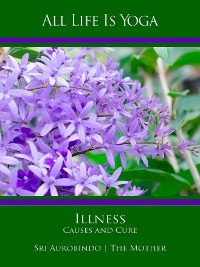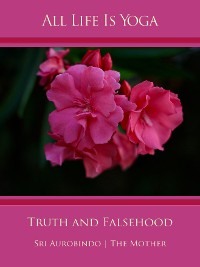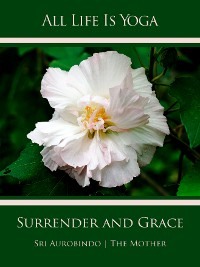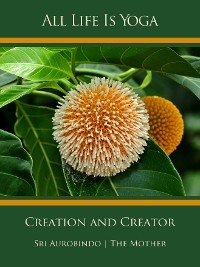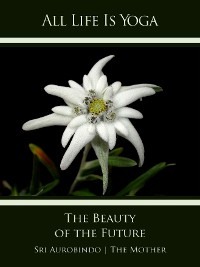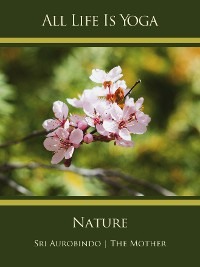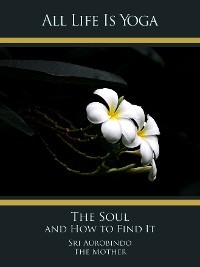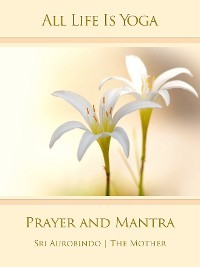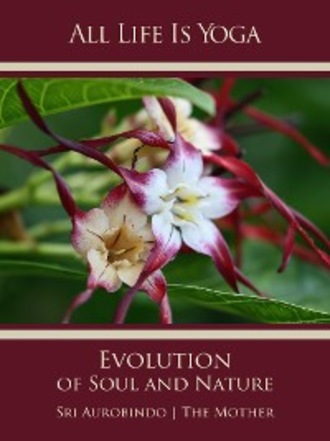
Полная версия
All Life Is Yoga: Evolution of Soul and Nature
The true foundation of the theory of rebirth is the evolution of the soul, or rather its efflorescence out of the veil of Matter and its gradual self-finding. Buddhism contained this truth involved in its theory of Karma and emergence out of Karma but failed to bring it to light; Hinduism knew it of old, but afterwards missed the right balance of its expression. Now we are again able to restate the ancient truth in a new language and this is already being done by certain schools of thought, though still the old incrustations tend to tack themselves on to the deeper wisdom. And if this gradual efflorescence be true, then the theory of rebirth is an intellectual necessity, a logically unavoidable corollary. But what is the aim of that evolution? Not conventional or interested virtue and the faultless counting out of the small coin of good in the hope of an apportioned material reward, but the continual growth towards a divine knowledge, strength, love and purity. These things alone are real virtue and this virtue is its own reward. The one true reward of the works of love is to grow ever in capacity and delight of love up to the ecstasy of the spirit’s all-seizing embrace and universal passion; the one reward of the works of right Knowledge is to grow perpetually into the infinite Light; the one reward of the works of right Power is to harbour more and more of the Force Divine, and of the works of purity to be freed more and more from egoism into that immaculate wideness where all things are transformed and reconciled into the divine equality. To seek other reward is to bind oneself to a foolishness and a childish ignorance; and to regard even these things as a reward is an unripeness and an imperfection.
And what of suffering and happiness, misfortune and prosperity? These are experiences of the soul in its training, helps, props, means, disciplines, tests, ordeals, – and prosperity often a worse ordeal than suffering. Indeed, adversity, suffering may often be regarded rather as a reward to virtue than as a punishment for sin, since it turns out to be the greatest help and purifier of the soul struggling to unfold itself. To regard it merely as the stern award of a Judge, the anger of an irritated Ruler or even the mechanical recoil of result of evil upon cause of evil is to take the most superficial view possible of God’s dealings with the soul and the law of the world’s evolution. And what of worldly prosperity, wealth, progeny, the outward enjoyment of art, beauty, power? Good, if they be achieved without loss to the soul and enjoyed only as the outflowing of the divine Joy and Grace upon our material existence. But let us seek them first for others or rather for all, and for ourselves only as a part of the universal condition or as one means of bringing perfection nearer.
The soul needs no proof of its rebirth any more than it needs proof of its immortality. For there comes a time when it is consciously immortal, aware of itself in its eternal and immutable essence. Once that realisation is accomplished, all intellectual questionings for and against the immortality of the soul fall away like a vain clamour of ignorance around the self-evident and ever-present truth. Tato na vicikitsate. That is the true dynamic belief in immortality when it becomes to us not an intellectual dogma but a fact as evident as the physical fact of our breathing and as little in need of proof or argument. So also there comes a time when the soul becomes aware of itself in its eternal and mutable movement; it is then aware of the ages behind that constituted the present organisation of the movement, sees how this was prepared in an uninterrupted past, remembers something of the bygone soul-states, environments, particular forms of activity which built up its present constituents and knows to what it is moving by development in an uninterrupted future. This is the true dynamic belief in rebirth, and there too the play of the questioning intellect ceases; the soul’s vision and the soul’s memory are all. Certainly, there remains the question of the mechanism of the development and of the laws of rebirth where the intellect and its inquiries and generalisations can still have some play. And here the more one thinks and experiences, the more the ordinary, simple, cut-and-dried account of reincarnation seems to be of doubtful validity. There is surely here a greater complexity, a law evolved with a more difficult movement and a more intricate harmony out of the possibilities of the Infinite. But this is a question which demands long and ample consideration; for subtle is the law of it. Anur hyesa dharmah.
* * *
1 This was written in pre-Einsteinian days.
2 Or used to accept, but now it is suggested that this order is only a schema created by our own mind or determined by the constitution of our brain, a syntax and logic of word and thought which we impose on a world that in fact does not or may not contain any such thing.
3 Poor and wretched souls are they who make the fruit of their works the object of their thoughts and activities. [Gita 2.49]
Chapter 2
The Reincarnating Soul
Words of Sri Aurobindo
Human thought in the generality of men is no more than a rough and crude acceptance of unexamined ideas. Our mind is a sleepy or careless sentry and allows anything to pass the gates which seems to it decently garbed or wears a plausible appearance or can mumble anything that resembles some familiar password. Especially is this so in subtle matters, those remote from the concrete facts of our physical life and environment. Even men who will reason carefully and acutely in ordinary matters and there consider vigilance against error an intellectual or a practical duty, are yet content with the most careless stumbling when they get upon higher and more difficult ground. Where precision and subtle thinking are most needed, there they are most impatient of it and averse to the labour demanded of them. Men can manage fine thought about palpable things, but to think subtly about the subtle is too great a strain on the grossness of our intellects; so we are content with making a dab at the truth, like the painter who threw his brush at his picture when he could not get the effect that he desired. We mistake the smudge that results for the perfect form of a verity.
It is not surprising then that men should be content to think crudely about such a matter as rebirth. Those who accept it, take it usually ready-made, either as a cut-and-dried theory or a crude dogma. The soul is reborn in a new body, – that vague and almost meaningless assertion is for them sufficient. But what is the soul and what can possibly be meant by the rebirth of a soul? Well, it means reincarnation; the soul, whatever that may be, had got out of one case of flesh and is now getting into another case of flesh. It sounds simple, – let us say, like the Djinn of the Arabian tale expanding out of and again compressing himself into his bottle or perhaps as a pillow is lugged out of one pillowcase and thrust into another. Or the soul fashions for itself a body in the mother’s womb and then occupies it, or else, let us say, puts off one robe of flesh and then puts on another. But what is it that thus “leaves” one body and “enters” into another? Is it another, a psychic body and subtle form, that enters into the gross corporeal form, – the Purusha perhaps of the ancient image, no bigger than a man’s thumb, or is it something in itself formless and impalpable that incarnates in the sense of becoming or assuming to the senses a palpable shape of bone and flesh?
In the ordinary, the vulgar conception there is no birth of a soul at all, but only the birth of a new body into the world occupied by an old personality unchanged from that which once left some now discarded physical frame. It is John Robinson who has gone out of the form of flesh he once occupied; it is John Robinson who tomorrow or some centuries hence will reincarnate in another form of flesh and resume the course of his terrestrial experiences with another name and in another environment. Achilles, let us say, is reborn as Alexander, the son of Philip, a Macedonian, conqueror not of Hector but of Darius, with a wider scope, with larger destinies; but it is still Achilles, it is the same personality that is reborn, only the bodily circumstances are different. It is this survival of the identical personality that attracts the European mind today in the theory of reincarnation. For it is the extinction or dissolution of the personality, of this mental, nervous and physical composite which I call myself that is hard to bear for the man enamoured of life, and it is the promise of its survival and physical reappearance that is the great lure. The one objection that really stands in the way of its acceptance is the obvious non-survival of memory. Memory is the man, says the modern psychologist, and what is the use of the survival of my personality, if I do not remember my past, if I am not aware of being the same person still and always? What is the utility? Where is the enjoyment?
............
Chapter 3
Rebirth, Evolution, Heredity
Words of Sri Aurobindo
Two truths, discoveries with an enormous periphery of luminous result and of a considerable essential magnitude, evolution and heredity, figure today in the front of thought, and I suppose we have to take them as a well-established unquenchable light upon our being, lamps of a constant lustre, though not yet very perfectly trimmed, final so far as anything is final in man’s constantly changing cinematographic process of the development of intellectual knowledge. They may be said to make up almost the whole fundamental idea of life in the way of seeing peculiar to a mind dominated, fashioned, pressed into its powerful moulds by the exact, curious, multifariously searching, yet in the end singularly limited observation and singularly narrow reason of our modern science. Science is in her own way a great seer and magician; she has both the microscopic and the macroscopic, the closely gazing and the telescopic view, a dissolving power of searching analytic resolution, a creative power of revealing synthetic effectuation. She has hunted to their lair many of the intermediate secret processes of the great creatrix, and even she has been able, by the inventive faculty given to us, to go and do one better. Man, this midget in infinity, locomotive yet nailed to the contiguity of a petty crust of soil by the force of gravitation, has certainly scored by her a goodly number of points against the mother of the universe. But all this has been done in some perfection only in the limits of her lowest obtrusive physical field.
Face to face with psychic and spiritual secrecies, as in the open elementary world even of mind, Science has still the uninformed gaze and the groping hands of the infant. In that sphere she, so precise, illuminative, compelling in the physical, sees only the big blazing buzzing confusion which James tells us, with a possibly inaccurate vividness of alliterative phrase, is the newborn baby’s view of the sensible world into which he has dropped down the mysterious stairs of birth. Science, faced with what are still to her the wonderful random accords and unexplained miracles of consciousness, protects herself from the errors of the imagination, – but stumbling incidentally by that very fact into plenty of the errors of an inadequate induction, – behind an opaque shield of cautelous scepticism. She clings with the grasping firmness of the half-drowned to planks of security she thinks she has got in a few well-tested correspondences, – so-styled, though the word as used explains nothing, – between mental action and its accompaniment of suggestive or instrumental physical functionings. She is determined, if she can, to explain every supraphysical phenomenon by some physical fact; psychological process of mind must not exist except as result or rendering of physiological process of body. This set resolution, apparently rational and cautious of ascertainable and firmly tangible truth, but really heroic in its paradoxical temerity, shuts up her chance of rapid discovery, for the present at least, in a fairly narrow circle. It taints too her extensions of physical truth into the psychological field with a pursuing sense of inadequacy. And this inadequacy in extended application is very evident in her theories of heredity and evolution when she forces them beyond their safe ground of physical truth and labours to illumine by them the subtle, complex, elusive phenomena of our psychological being.
There are still, I dare say, persons here and there who cherish a secret or an open unfaith in the theory of a physical evolution and believe that it will one day pass into the limbo of dead generalisations like the Ptolemaic theory in astronomy or like the theory of humours in medicine; but this is a rare and excessive scepticism. Yet it may not be without use or aptitude for our purpose to note that contrary to current popular notions the scientific account of this generalisation, like that of a good number of others, is not yet conclusively proved, even though now taken for granted. But still there is on the whole a mass of facts and indications in its favour so considerable as to look overwhelming, so that we cannot resist the conclusion that in this way or some such way the whole thing came about and we find it difficult to conceive any more convincing explanation of the indubitable ascending and branching scale of genus and species which meets even our casual scrutiny of living existence. One thing at least seems now intellectually certain, we can no longer believe that these suns and systems were hurled full-shaped and eternally arranged into boundless space and all these numberless species of being planted on earth ready-made and nicely tailored in seven days or any number of days in a sudden outburst of caprice or Dionysiac excitement or crowded activity of mechanical conception by the fiat of a timeless Creator. The successive development which was summarily proposed by ancient Hindu thinkers, the lower forms of being first, man afterwards as the crown of the Spirit’s development of life on earth, has been confirmed by the patient and detailed scrutiny of physical science, – an aeonic development, though the farther Hindu conception of a constant repetition of the principle in cycles is necessarily incapable of physical evidence.
............
Chapter 4
Rebirth and Soul Evolution
Words of Sri Aurobindo
The ideas that men currently form about life and things are for the most part pragmatic constructions. They are forms of a reason which is concerned with giving only such a serviceable account to itself of its surroundings as shall make a sufficient clue to our immediate business of the growth, action, satisfaction of the personality, something feasible, livable, effective for our journeying in Time, something viable in the twofold French sense of the word. Whether it corresponds to or is directly in touch with any real reality of things seems to be very much a matter of accident. It seems to be sufficient if we can persuade our facile and complaisant reason of its truth and find it serviceable and fruitful in consequences for thought, action and life-experience. It is true that there is another unpragmatic reason in us which labours to get rid of this demand of the intellectual and vital personality; it wants to look at the real truth of things without veils and without any object, to mirror the very image of Truth in the still waters of a dispassionate, clear and pure mentality. But the workings of this calmer greater reason are hampered by two tremendous difficulties. First, it seems next to impossible to disengage it entirely from the rest of ourselves, from the normal intellectuality, from the will to believe, from that instinct of the intelligence which helps the survival, by a sort of subtle principle of preference and selection, of the way of thinking that suits our personal bent or the accomplished frame of our nature. And again, what is the Truth that our reason mirrors? It is after all some indirect image of Truth, not her very self and body seen face to face; it is an image moulded from such data, symbol, process of Reality, – if any real Reality there is, – as we can gather from the very limited experience of self and existing things open to human mind. So that unless there be some means by which knowledge can burst through all veils to the experience of the very Reality itself, or unless there be some universal Logos, divine Mind or Supermind, which knows itself and all things and our consciousness can reflect or get into touch with that, a pursuing insufficiency and uncertainty must always keep its baffling grasp upon even the highest power and largest walk of our reason and beset all the labour of human knowledge.
............
Chapter 5
The Significance of Rebirth
Words of Sri Aurobindo
The one question which through all its complexities is the sum of philosophy and to which all human enquiry comes round in the end, is the problem of ourselves, – why we are here and what we are, and what is behind and before and around us, and what we are to do with ourselves, our inner significances and our outer environment. In the idea of evolutionary rebirth, if we can once find it to be a truth and recognise its antecedents and consequences, we have a very sufficient clue for an answer to all these connected sides of the one perpetual question. A spiritual evolution of which our universe is the scene and earth its ground and stage, though its plan is still kept back above from our yet limited knowledge, – this way of seeing existence is a luminous key which we can fit into many doors of obscurity. But we have to look at it in the right focus, to get its true proportions and, especially, to see it in its spiritual significance more than in its mechanical process. The failure to do that rightly will involve us in much philosophical finessing, drive on this side or the other to exaggerated negations and leave our statement of it, however perfect may be its logic, yet unsatisfying and unconvincing to the total intelligence and the complex soul of humanity.
The bare idea of repeated births as the process of our soul existence does not carry us much farther than the simple material reality of this single life in the body, that first fact of our conscious sensation and memory which is the occasion of all our speculations. Behind our present starting-point and preceding this one lappet of our race in the fields of being rebirth reminds us indeed of a past, of pregnant anterior courses, a soul-existence in many previous bodies which have immediately created what we now are. But to what use or advantage if there is no progressive significance in our pre-existence and our persevering continuity? In front of us it rolls far back from our vision the obstruction of the near blank wall of death; our journeying upon earth becomes less of a long or brief unretraceable road ending abruptly and perplexingly in a cul-de-sac; our physical dissolution is robbed of the cruellest poison of its sting. For the burden of death to man the thinking, willing, feeling creature is not the loss of this poor case or chariot of body, but it is the blind psychical finality death suggests, the stupid material end of our will and thought and aspiration and endeavour, the brute breaking off of the heart’s kind and sweet relations and affections, the futile convicting discontinuity of that marvellous and all-supporting soul-sense which gives us our radiant glimpses of the glory and delight of existence, – that is the discord and harsh inconsequence against which the thinking living creature revolts as incredible and inadmissible. The fiery straining to immortality of our life, mind, psyche, which can assent to cessation only by turning in enmity upon their own flame of nature, and the denial of it which the dull acquiescence of a body consenting inertly to death as to life brings in on us, is the whole painful irreconcilable contradiction of our double nature. Rebirth takes the difficulty and solves it in the sense of a soul continuity with a beat of physical repetition. Like other non-materialistic solutions it gives the right to the soul’s suggestion as against the body’s and sanctions the demand for survival, but unlike some others it justifies the bodily life by its utility to the soul’s continued self-experience; our too swift act in the body ceases to be an isolated accident or an abrupt interlude, it gets the justification of a fulfilling future as well as a creating past for its otherwise haphazard actions and relations. But simple persistence, mechanical continuity is not enough; that is not all our psychical being signifies, not the whole luminous meaning of survival and continuity; without ascension, without expansion, without some growing up straight into light in the strength of our spirit our higher members toil here uncompleted, our birth in matter is not justified by any adequate meaning. We are very little better off than if death remained our ending; for our life in the end becomes then an indefinitely continued and renewed and temporarily consequent in place of an inconsequent, abruptly ended and soon convicted futility.
............
Chapter 6
The Ascending Unity
Words of Sri Aurobindo
The human mind loves a clear simplicity of view; the more trenchant a statement, the more violently it is caught by it and inclined to acceptance. This is not only natural to our first crudity of thinking, and the more attractive because it makes things delightfully easy to handle and saves an immense amount of worry of enquiry and labour of reflection, but, modified, it accompanies us to the higher levels of a more watchful mentality. Alexander’s method with the fateful knot is our natural and favourite dealing with the tangled web of things, the easy cut, the royal way, the facile philosophy of this and not this, that and not that, a strong yes and no, a simple division, a pair of robust opposites, a clean cut of classification. Our reason acts by divisions, even our ordinary illogical thought is a stumbling and bungling summary analysis and arrangement of the experience that offers itself to us with such unending complexity. But the cleanest and clearest division is that which sets us most at ease, because it impresses on our still childlike intelligence a sense of conclusive and luminous simplicity.
But the average mind enamoured of a straight and plain thinking, for which, for a famous instance, that great doctor Johnson thought with the royal force dear to all strong men when he destroyed Berkeley’s whole philosophy by simply kicking a stone and saying “There I prove the reality of matter,” is not alone affected by this turn towards simple solutions. Even the philosopher, though he inclines to an intricate reasoning by the way, is best delighted when he can get by it to some magnificently conclusive conclusion, some clean-cutting distinction between Brahman and non-Brahman, Reality and unreality or any of the host of mental oppositions on which so many “isms” have been founded. These royal roads of philosophy have the advantage that they are highly and grandly cut for the steps of the metaphysical intellect and at the same time attract and overpower the ordinary mind by the grandiose eminence of the peak in which they end, some snow-white heaven-cutting Matterhorn of sovereign formula. What a magnificent exterminating sweep do we hear for instance in that old renowned sentence, brahma satyam jagan mithya, the Eternal alone is true, the universe is a lie, and how these four victorious words seem to settle the whole business of God and man and world and life at once and for ever in their uncompromising antithesis of affirmation and negation. But after all perhaps when we come to think more at large about the matter, we may find that Nature and Existence are not of the same mind as man in this respect, that there is here a great complexity which we must follow with patience and that those ways of thinking have most chance of a fruitful truth-yielding, which like the inspired thinking of the Upanishads take in many sides at once and reconcile many conflicting conclusions. One can hew material for a hundred philosophies out of the Upanishads as if from some bottomless Titans’ quarry and yet no more exhaust it than one can exhaust the opulent bosom of our mother Earth or the riches of our father Ether.


